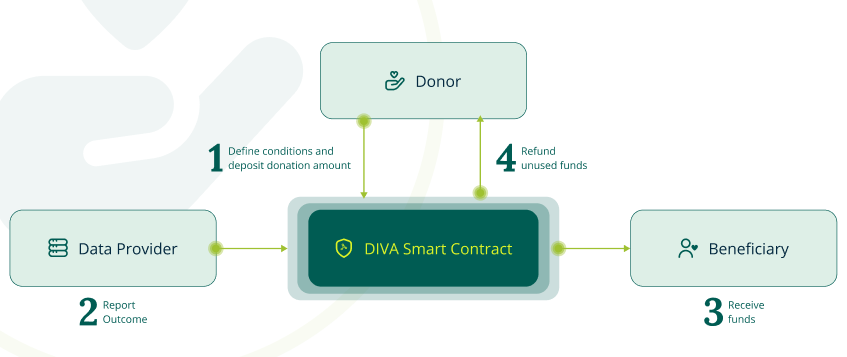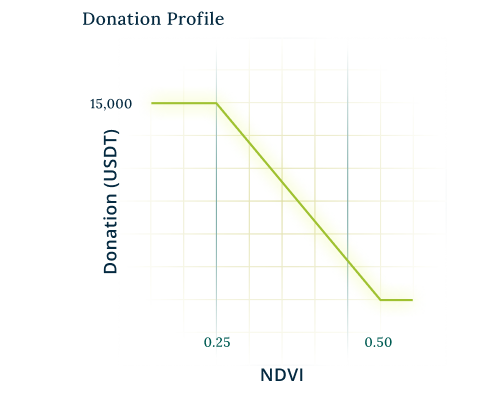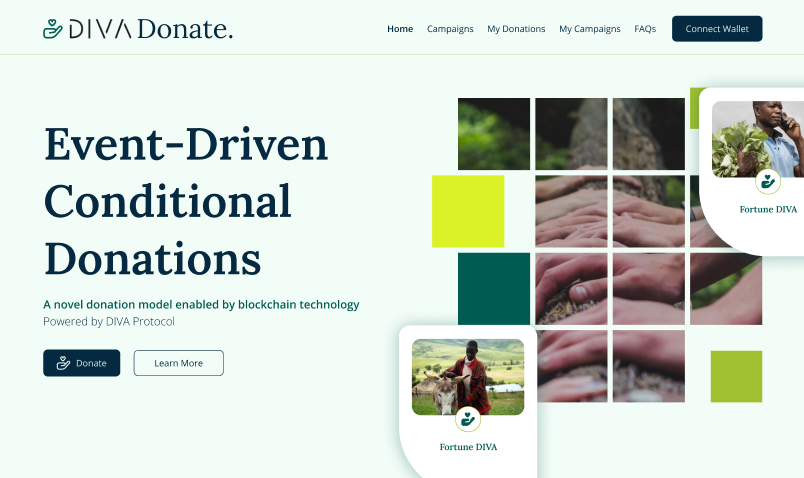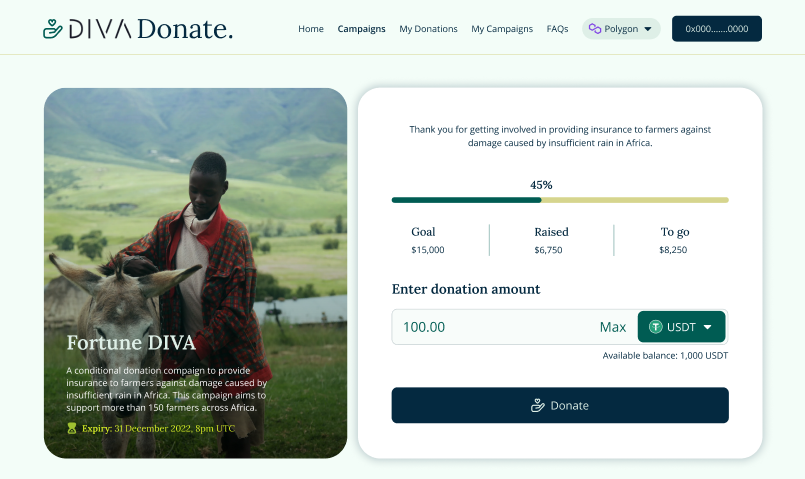
Event-driven conditional donations - A pilot program by DIVA Technologies AG, Fortune Connect and Shamba Network
By Walodja1987 at
Back in July, we shared an idea of how DIVA Protocol can be used to create event-driven conditional donation products that financially assist farmers in adverse moments such as crop or livestock loss caused by natural disasters such as drought and floods.
Today, we are thrilled to announce that we partnered up with Fortune Connect, a financial inclusion hub for farmers in Kenya, and Shamba Network, a web3 project providing ecological data to smart contracts, to launch a conditional donation pilot campaign powered by DIVA Protocol.
Before we dive into the campaign details, let’s briefly revisit what conditional donations are, how they compare to direct donations and how smart contract technology, and DIVA Protocol in particular, can help to implement them in a transparent and cost effective way.
What are conditional donations?
Conditional donations differ from direct donations in that they come with certain conditions attached. These conditions specify under which circumstances funds will be released to the recipient. For example, a donation may be conditioned on the rain amount over a certain period of time in a given area. If it falls below a predefined level that is associated with drought, the donation will be triggered to financially support the people affected. If it stays above that level, no donation will be triggered.
What are the benefits compared to direct donations?
Conditional donations can provide a number of benefits compared to direct donations:
- Greater control: Because the terms of the donation are specified upfront, donors can ensure that their funds are used in a way that aligns with their values and priorities. This can be particularly useful for donors who want to support specific causes or who have specific goals in mind for their donation.
- Based on need: Conditional donations are only released if recipient’s are in actual need. This can help to ensure that the funds are used in the most effective way possible and can help to maximize the positive impact of the donation.
- Greater impact: Unused funds can be redeployed into new conditional donation campaigns, thereby maximizing the impact and reach of the donation.
- Verifiable: The underlying trigger events are publicly verifiable and the release of the donation is detached from any potential external bias.
What are the benefits of using smart contract technology to implement conditional donations?
Blockchain-based smart contract technology can provide a number of benefits for implementing conditional donations:
- Transparency: Donation flows are transparent and auditable on the blockchain.
- Trustless: Funds are being held in a programmatic escrow rather than by a central party eliminating the risk of misuse and fraud.
- Efficient: Programmatically enforced rules remove the need for manual processes which allows a quicker release of funds.
- Frictionless: Money can come from across the globe to assist farmers.
Why DIVA Protocol?
DIVA Protocol is a smart contract that acts as an operating system for derivative applications. More precisely, it allows its users to create and settle derivative products in a permissionless and trustless way. As conditional donations derive their payout based on the outcome of an underlying event, they are considered derivative products and can be implemented using DIVA Protocol.
How it works?
The process of a conditional donation is illustrated below:

The DIVA smart contract manages the full conditional donation cycle in a trustless and predictable manner. In particular, it allows donors to deposit funds (e.g., in the form of stablecoins such as USDT or other digital assets) and issue tokenized contingent claims to beneficiaries (1), data providers to report event outcomes (2) and beneficiaries to claim their share in the donation after the outcome has been reported and the payout has been determined by the DIVA smart contract (3). Any unused funds can be claimed by the donor and redeployed into a new conditional donation campaign (4).
About the campaign
The goal of the pilot campaign is to provide farmers that are located in the Horn of Africa region financial support in case of a drought.
The region, which is stretching from southern Ethiopia to northern Kenya and Somalia, is experiencing regular droughts caused by climate change and extreme weather events which results in curtailed agricultural production, destroyed crops and extreme livestock losses. Massive livestock deaths disrupt the flow of income and food sources for the local farmers (so-called “pastoralists”) and their families.
The goal of the campaign is to raise $15’000 to provide 100 pastoralists ($150 each) with financial support in case of a drought. The support is equivalent to the value of one livestock per pastoralist.
What is the trigger metric?
The average NDVI, or Normalized Difference Vegetation Index, observed in the period 1 Feb - 30 April 2023 (dates subject to change) will serve as the trigger metric. The NDVI measures the density and health of vegetation in a given region and is often used as an indicator for drought. It is calculated by taking the difference between the near-infrared and red light reflectance of an area, and then dividing by the sum of the two. Higher NDVI values indicate a greater density of healthy vegetation, while lower values indicate that the plants in an area are experiencing drought stress.
The NDVI data can be collected by satellite imagery, aerial photography, and ground-based sensors. For the pilot program, Shamba Network, a web3 project focused on the provision of ecological data to smart contracts, will sponsor the outcome reporting. Shamba Network taps into remote sensing data from satellites operated by NASA, ESA and other space agencies to provide an updated picture of environmental conditions across the globe.
What are the donation scenarios?
The donation release profile is described by the chart below. Note that the chosen NDVI values are for presentation purposes only and may change for the actual product.

The given payoff profile results in the following donation scenarios:
- $15’000 - if NDVI is smaller than or equal to 0.50
- $12’000 - if NDVI is 0.55
- $7’500 - if NDVI is 0.625
- $0 - if NDVI is larger than or equal to 0.75
The donations can be claimed from the DIVA smart contract after the NDVI has been reported. Any unused funds can be re-claimed by the donor and re-deployed into new campaigns.
DIVA Donate
The campaign will be released on DIVA Donate, a platform that is being developed by DIVA Technologies AG, to offer donors and donation recipients a seamless experience. Some sneak peeks of the website are provided below.


Get in touch
If you want to donate, are interested in launching your own conditional donation campaign or discuss other derivative use cases (e.g. using CO2 emissions or air quality as underlying metrics), please get in touch.
About DIVA Technologies AG
DIVA Technologies AG is a Swiss based software consulting firm that consults traditional businesses as well as DAOs in Web3 development. The company was founded in 2022 by Wladimir Weinbender, Co-Founder of DIVA Protocol, a smart contract that acts as an operating system for a wide range of derivative applications including insurance, predictions, structured products, credit default swaps, etc.
About Fortune Connect
Fortune Connect is a digital financial inclusion hub enabling farmers to access market information, technical knowledge, financial literacy, and financial access tools for credit and insurance in Kenya. Fortune Connect Innovation was started in 2021 and incubated by Fortune Credit before rolling out to several places in rural Kenya.
About Shamba Network
Shamba Network powers an oracle that enables the collection, analytics and use of ecological data on-chain. It provides the web3 ecosystem with infrastructure that allows insight into the physical world, enabling things like ecological impact to be monitored. Through the Shamba oracle, smart contracts can get updated on what is happening on the ground and use this data to trigger a wide variety of actions.